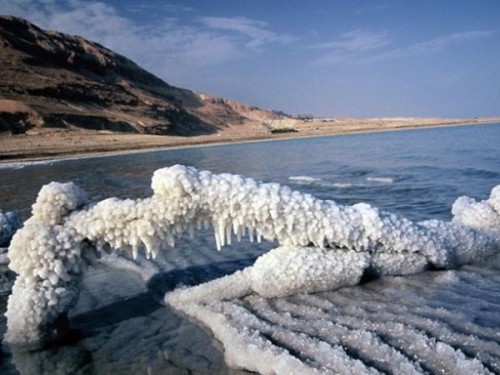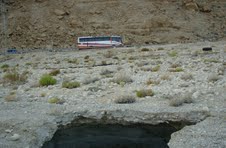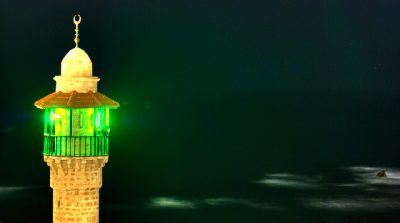 Tourists still love the Dead Sea’s mineral rich waters. But for how long?
Tourists still love the Dead Sea’s mineral rich waters. But for how long?
Despite the fact that the Dead Sea is shrinking by as much as one meter a year, the “lowest dry land point on earth” is becoming more and more popular as a tourist site for people the world over. This fact was noted in an August 5th New York Times article that mentioned beaches on the salt lake’s northern shore being filled with diversified groups of people, including ultra orthodox Jewish men and women from Jerusalem, Palestinians from the West Bank, other Israelis from all over Israel, and Christian Pilgrims who visit places like Kasher el Yehud, the traditional Baptismal place of Jesus. Chasing the Sea
Yusef Matari, at the private beach of Neve Midbar (Desert Oasis), has been working there as a lifeguard for 20 years, and talked about the lake’s declining shoreline. “We chase after the water with steps. It changes every month. There is no permanent shoreline,” he says. In addition to a drastically receding shoreline, the land area surrounding the late is dotted with scores of sinkholes, caused by soil instability due to the receding waters. Some of these sinkholes are large enough to “swallow” cars as well as people.
 A sinkhole on the Dead Sea’s shore
A sinkhole on the Dead Sea’s shore
The Dead Sea, and how to save it from receding further, was the subject of a Jerusalem Post Metro Magazine article last month, in which an ongoing study concerning mixing Dead Sea with less saline Red Sea water was covered, along with comments by groups involved including The Israel Geological Survey and the environmental watchdog NGO Friends of the Earth Middle East (FoEME), whose Israel branch is head by Gidon Bromberg.
Those who ruin must now restore
Bromberg’s NGO is also involved in trying to revive the Lower Jordan River, one of the main water sources for the Dead Sea. Speaking to a group of journalists on a recent Media Tour of the Lower Jordan, Bromberg told them:
“The governments that have ‘contributed’ to the Jordan’s demise now have to contribute to its restoration. And projects like the proposed Red-Dead Sea Canal will only make the situation worse, since the last thing the Dead Sea needs (as well as the Jordan), is more salt.”
Dead and Red don’t mix well
Bromberg was referring specifically to the Dead –Red Sea Conveyance Project, studies of which seem to indicate that mixing the highly saline Dead Sea waters with the less saline “living” waters of the Red Sea may result in a number of unfavorable environmental consequences, which could also affect Jordan’s plans to undertake their own version of the conduit project.
Bromberg claims that the current Dead Sea and Red Sea water mixing studies are being rushed, and will not have enough time to reach a satisfactory conclusion before the deadline date of July, 2011. He continues:
The governments and politicians (who have self interests at heart) want a quick decision on this study. We believe that the Dead Sea can be stabilized by returning a minimum of at least 30% of the Lower Jordan River’s original flow. This can be done at a much more economical price, in both money and in terms of environmental impact, than the Red- Dead Conveyance Project – especially if both Israel and Jordan are equal partners in it.
The uniqueness of the Dead Sea, with its shoreline now measured at 411 meters below sea level (1,400 feet), has put it in line as one of the 7 New World Wonders. Israel, Jordan and Palestine, the three political entities that share its shoreline, are all promoting it as such.
Top image courtesy of new7wonders and sinkhole image via FoEME
:: NY Times
More Dead Sea articles:
Vote Today to Elect the Dead Sea as one of the Earth’s 7 New Natural Wonders
Raising the Dead: Is the Dead Sea Conveyance Project Viable?
That “Sinking Feeling”: Dead Sea Sinkhole Swallows Student


